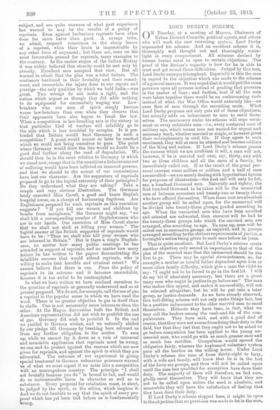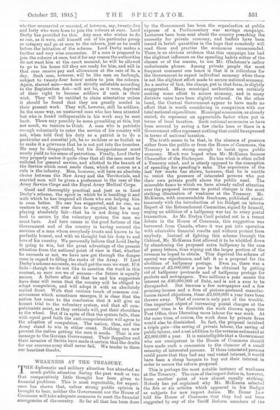LORD DERBY'S SCHEME.
ONTuesday, at a meeting of Mayors, Chairmen of Urban District Councils, political agents, and others who will work the new recruiting system, Lord Derby expounded his scheme. And an excellent scheme it is, thoroughly well thought out and thoroughly water- tight in every compartment. All schemes devised by human brains must be open to certain objections. The proof of the deviser's capacity is how far he is able to meet and get round those difficulties. Judged by this test, Lord Derby emerges triumphant. Especially is this the case in regard to the objection which was made to the scheme of a general canvass. It was urged that. it would put the same pressure upon all persons instead of grading that pressure in the matter of time ; and further, that if all the men were taken together there would be an embarrassing rush instead of what the War Office would naturally like—an even flow of men through the recruiting main. What Lord Derby proposes not only gets rid of those objections, but actually adds an inducement to men to enrol theme selves. The canvassers under his scheme will urge enrol- ment on every enlistable man—i.e., every =starred man of military age, which means men not wanted for urgent and necessary work, whether married or single, or however great their entanglements in civil life. If they agree to such enrolment, they *ill at once be attested and become soldiers of the King and nation. If Lord Derby's scheme proves the success which we are confident it will, a man will not, however, if he is married and over, say, thirty, and with two or three children and all the cares of a family, be immediately called out. If as the result of the great per- sonal canvass some million or million and a. half of men are enrolled—we are merely dealing with hypothetical figures for purposes of illustration—the first call will only be for, say, a hundred thousand men. Naturally and rightly, the first hundred thousand to be taken will be the unmarried men of between seventeen and twenty-two or twenty-three who have offered themselves. When these men are absorbed another group will be called upon, for the unmarried will be divided into twenty-three groups, graded according to ago. When the unmarried men who have been enrolled and attested are exhausted, then recourse will be had to the twenty-three groups into which the married men are arranged, also according to age. To sum up. men will be called out in successive groups as required, and in groups arranged according to the obvious requirements of justice, a fortnight's notice being given to each man before he joins.
That is quite excellent. But Lord Derby's scheme meets another objection only second in importance to that of the plea of the married mon that the unmarried should be the first to go. There may be special circumstances, as, for example, a mother or invalid father dependent upon him or some other family difficulty, which give a man the right to say : "I ought not to be forced to go in the first lot. I will do my bit if absolutely necessary, but there are a great many mon who ought in justice to go before me." The man who makes this appeal, and makes it successfully, will not be released altogether, but he will be put into a later group, as justice demands. As we have already observed, this well-fitting scheme will not only make things fair, but be a positive inducement to the older married men. to enrol themselves. Hitherto they have beet', in fact, what we may call the leaders among the rank-and-file of the com- pulsionists. They have said, and with a good deal of reason, that they were not averse from doing their duty in the field, but that they feel that they ought not to be asked to go before compulsion has been applied to the young un- married men, who could go with so much greater ease and so much less sacrifice. Compulsion would spread the obligation fairly, whereas the haphazard voluntary system puts all the burden on the willing horse. Under Lord Derby's scheme the man of from thirty-eight to forty, with a wife and family, will know that he is in the last of the forty-six groups, and thus will not be called upon until the men less qualified for exemption have done their duty. The majority of them will therefore, we feel sure, gladly enrol themselves. They will know that they are not to be called upon unless the need is absolute, and meanwhile they will have the satisfaction of feeling that they have done their duty. If Lord Derby's scheme stopped here, it might be open to the objection that no provision was made to let in the men, whether unmarried or married, of between, say, twenty-five and forty who were keen to join the colours at once. Lord Derby has provided for this. Any man who wishes to do so can, as it were, call himself out of his particular group or category and go at once to the colours, just as he could before the initiation of the scheme. Lord Derby makes a further and very wise concession. If a man is prepared to join the colours at once, but if for any reason the authorities do not want him at the exact moment, he will be allowed to go to his home till they are ready for him, and will in that case receive pay and allowances at the rate of 3s. a day. Such men, however, will be like men on furlough, subject to twenty-four hours' notice to join the colours. Again, starred men—men not strictly enlistable according to the Registration Act—will not be, as it were, deprived of their right to become soldiers if such is their wish. They will be entitled to claim attestation unless it should be found that they are greatly needed in their present work. They will, however, still be soldiers. In the same way, an unstarred man who has been attested but who is found indispensable in his work may be sent back. There may possibly be some grumbling at this, but not much, we venture to think. A. man who is patriotic enough voluntarily to enter the service of his country will not, when told that his duty as a patriot is to do a particular and essential job, be so reckless or so foolish as to make it a grievance that he is not put into the trenches. He may be disappointed, but his disappointment must surely yield to his sense of patriotism. Finally, Lord Derby very properly makes it quite clear that all the men must be enlisted for general service, and allotted to the branch of the Service which most needs them, which of course as a rule is the infantry. Men, however, will have an absolute choice between the New Army and the Territorials, and married men will be given a preference in the case of the Army Service Corps and the Royal Army Medical Corps.
Good and thoroughly practical and just as is Lord Derby's scheme, the spirit in which he is handling it and with which he has inspired all those who are helping him is even better. No one has suggested, and uo one, we venture to say, will ever dare to suggest, that he is not playing absolutely fair—that lie is not doing his very best to secure by the voluntary system the men we must have. And here comes iu the good fortune of the Government and of the country in having secured the services of a man whom everybody trusts and knows to be perfectly honest, and with no thought but his duty to and love of his country. We personally believe that Lord. Derby is going to win, but the great advantage of the present situation from the national point of view is that, whether he succeeds or not, we have now got through the danger zone in regard to filling the ranks of the Army. If Lord Derby's scheme succeeds, we shall get the men we want. If it fails—though we do not like to mention the word in this context, so sure are we of success—the future is equally secure. A failure after all that he and his supporters have done will mean that the country will be obliged to adopt compulsion, and will adopt it with an absolutely united front. With that curious touch of common con- sciousness which sometimes emerges, it is clear that the nation has come to the conclusion that it will give an honest trial to the voluntary system, and that all corn- pulsionists must, as they certainly will, put their shoulders to the wheel. But if in spite of that the system fails, then with equal good faith the anti-compulsionists will agree to the adoption of compulsion. The nation, then, and the Army stand to win in either event. Nothing can now prevent the nation getting the men it needs. That is our message to the German Government. Their Zeppelins and their invasion of Serbia have made it certain that the drafts for our overseas army shall never fail. We tender to them our heartiest thanks.







































 Previous page
Previous page